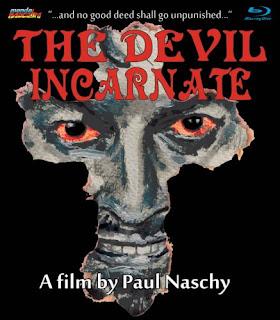
Initially titled The Traveler, The Devil Incarnate is a fascinating, occasionally riotous take on the human condition, all from the point of view of an outsider. A cynic of potentially supernatural origin, the film’s lead character is convinced there is very little good to be found in people, and spends the majority of the movie trying to prove this hypothesis.
Writer / director Paul Naschy stars as Leonardo, who, over the course of the film, will use his wits and quick thinking to get the upper hand on everyone he meets. With Tomas (David Rocha), a young man he rescued from a cruel master, as his companion, Leonardo lies, cheats, steals, screws, and murders his way through 16th century Spain.
Tomas believes Leonardo is a very intelligent man, the perfect mentor to instruct him in the ways of the world. But the truth is Leonardo may not be a “man” at all. In fact, all the evidence points to him being the devil in human form!
More a series of random adventures than a straightforward narrative, Naschy’s The Devil Incarnate is a bleak sermon on the baser elements of humanity, a sermon the filmmaker delivers with gusto to spare. After killing the first person he meets (a down-on-his-luck soldier) and saving Tomas, Leonardo makes his way to a small farm, where he seduces Ines (Silvia Aguilar), the farmer’s wife, before making off with she and her husband’s entire savings. Though a sweet girl when they first meet, Leonardo lures Ines into bed with a few choice words. Once the deed is done, he humiliates her, takes her money, and carves his “brand” into her backside. Tomas expresses regret at how Leonardo treated Ines, but Leonardo excuses his actions by reminding his young companion she was, in the end, a fornicator who was more than happy to cheat on her husband.
The Devil Incarnate progresses in much the same way from that point on: Leonardo coerces potential victims into wrongdoings, bringing their greedy or lustful ways to the forefront before robbing them blind. Naschy gives a bravura performance as the “devilish” Leonardo, spewing cryptic dialog on the weaknesses of humanity, yet doing so with such exuberance that it’s clear he had a blast playing the part.
Leonardo’s saddest encounter comes when he enters the home of Dona Aurora (Sara Lezana), a once-proud member of the aristocracy who has fallen on hard times. Her husband dead and her money all but gone, Dona Aurora is also mourning the inevitable loss of her young daughter, who doctors say is suffering from a fatal illness. Leonardo claims he can save the girl, but only if Dona Aurora will afterwards spend the night with him. She agrees, and the girl immediately recovers, leading to a prolonged sequence in which Leonardo and Dona Aurora make love (being a ‘70s genre film, there is no shortage of nudity and sex in The Devil Incarnate, this scene included). Without spoiling it, what eventually happens to Dona Aurora after her encounter with Leonardo results in the film’s most heartbreaking moment.
That said, there is plenty of comedy to be found in The Devil Incarnate as well, everything from a humorous showdown with a stuttering moneylender (Pepe Ruiz) and his nagging wife (Paloma Hurtado) to a romp at a brothel, sped up via fast-motion, that features music and physical humor so outlandish it could have been lifted from an episode of Benny Hill. Naschy also shows off his range as a director, infusing The Devil Incarnate with an energy that never falters while also capturing some truly remarkable images (a late “crucifixion scene”, set in the ruins of a monastery, is striking in its beauty).
On top of everything else, the actor / director offers up “food for thought” throughout The Devil Incarnate, providing one shocking revelation after another on the human condition. At one point, Tomas laments the state of the world, and tells Leonardo he is holding out hope that the future will be much brighter. With a smile, Leonardo predicts his young friend will, that very night, dream of the future. When Tomas closes his eyes, he is horrified by images (via black and white stock footage) of the atrocities of World War II, everything from Nazi bombings to concentration camps. Naschy’s point is clear: mankind’s barbarity remained not only constant through the centuries, but has gotten worse.
This is certainly not an uplifting message, yet The Devil Incarnate somehow manages to be an uplifting film, for both the craft on display and the sheer joy that Naschy took in making this movie. His efforts would be rewarded: The Devil Incarnate was nominated for Best International Film at the Fantosporto Festival, and took home an award at 1978’s Eurocon. And the film feels just as fresh and original today as I’m sure it did upon its initial release.
The Devil Incarnate is a movie to treasure.
Rating: 9.5 out of 10
